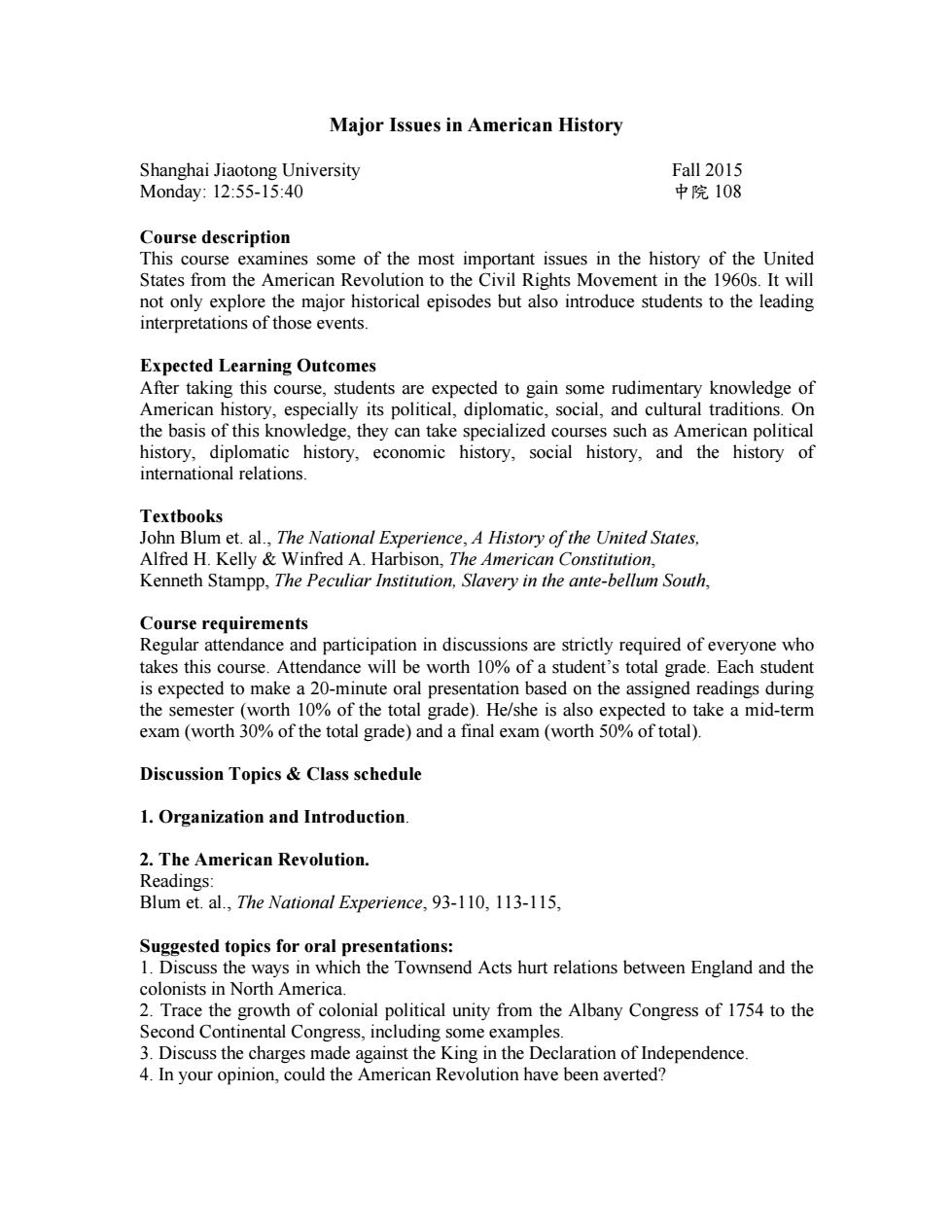
Major Issues in American History Shanghai Jiaotong University Fall 2015 Monday:12:55-15:40 中院108 Course description This course examines some of the most important issues in the history of the United States from the American Revolution to the Civil Rights Movement in the 1960s.It will not only explore the major historical episodes but also introduce students to the leading interpretations of those events. Expected Learning Outcomes After taking this course,students are expected to gain some rudimentary knowledge of American history,especially its political,diplomatic,social,and cultural traditions.On the basis of this knowledge,they can take specialized courses such as American political history,diplomatic history,economic history,social history,and the history of international relations. Textbooks John Blum et.al.,The National Experience,A History of the United States, Alfred H.Kelly Winfred A.Harbison,The American Constitution, Kenneth Stampp,The Peculiar Institution,Slavery in the ante-bellum South, Course requirements Regular attendance and participation in discussions are strictly required of everyone who takes this course.Attendance will be worth 10%of a student's total grade.Each student is expected to make a 20-minute oral presentation based on the assigned readings during the semester (worth 10%of the total grade).He/she is also expected to take a mid-term exam (worth 30%of the total grade)and a final exam (worth 50%of total). Discussion Topics Class schedule 1.Organization and Introduction 2.The American Revolution. Readings: Blum et.al.,The National Experience,93-110,113-115, Suggested topics for oral presentations: 1.Discuss the ways in which the Townsend Acts hurt relations between England and the colonists in North America. 2.Trace the growth of colonial political unity from the Albany Congress of 1754 to the Second Continental Congress,including some examples. 3.Discuss the charges made against the King in the Declaration of Independence. 4.In your opinion,could the American Revolution have been averted?
Major Issues in American History Shanghai Jiaotong University Fall 2015 Monday: 12:55-15:40 中院 108 Course description This course examines some of the most important issues in the history of the United States from the American Revolution to the Civil Rights Movement in the 1960s. It will not only explore the major historical episodes but also introduce students to the leading interpretations of those events. Expected Learning Outcomes After taking this course, students are expected to gain some rudimentary knowledge of American history, especially its political, diplomatic, social, and cultural traditions. On the basis of this knowledge, they can take specialized courses such as American political history, diplomatic history, economic history, social history, and the history of international relations. Textbooks John Blum et. al., The National Experience, A History of the United States, Alfred H. Kelly & Winfred A. Harbison, The American Constitution, Kenneth Stampp, The Peculiar Institution, Slavery in the ante-bellum South, Course requirements Regular attendance and participation in discussions are strictly required of everyone who takes this course. Attendance will be worth 10% of a student’s total grade. Each student is expected to make a 20-minute oral presentation based on the assigned readings during the semester (worth 10% of the total grade). He/she is also expected to take a mid-term exam (worth 30% of the total grade) and a final exam (worth 50% of total). Discussion Topics & Class schedule 1. Organization and Introduction. 2. The American Revolution. Readings: Blum et. al., The National Experience, 93-110, 113-115, Suggested topics for oral presentations: 1. Discuss the ways in which the Townsend Acts hurt relations between England and the colonists in North America. 2. Trace the growth of colonial political unity from the Albany Congress of 1754 to the Second Continental Congress, including some examples. 3. Discuss the charges made against the King in the Declaration of Independence. 4. In your opinion, could the American Revolution have been averted?
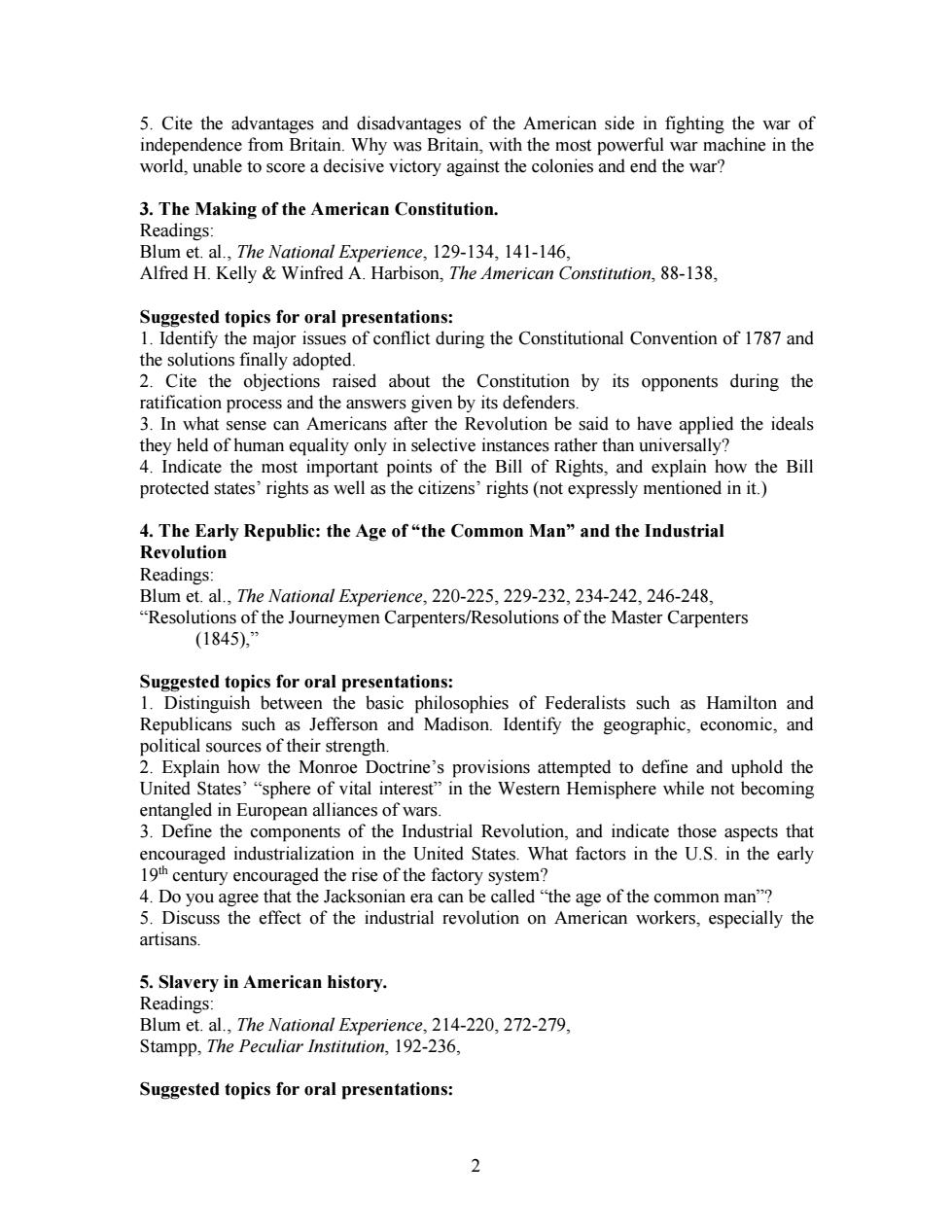
5.Cite the advantages and disadvantages of the American side in fighting the war of independence from Britain.Why was Britain,with the most powerful war machine in the world,unable to score a decisive victory against the colonies and end the war? 3.The Making of the American Constitution. Readings: Blum et.al.,The National Experience,129-134,141-146, Alfred H.Kelly Winfred A.Harbison,The American Constitution,88-138. Suggested topics for oral presentations: 1.Identify the major issues of conflict during the Constitutional Convention of 1787 and the solutions finally adopted. 2.Cite the objections raised about the Constitution by its opponents during the ratification process and the answers given by its defenders. 3.In what sense can Americans after the Revolution be said to have applied the ideals they held of human equality only in selective instances rather than universally? 4.Indicate the most important points of the Bill of Rights,and explain how the Bill protected states'rights as well as the citizens'rights(not expressly mentioned in it.) 4.The Early Republic:the Age of"the Common Man"and the Industrial Revolution Readings: Blum et.al.,The National Experience,220-225,229-232,234-242,246-248 "Resolutions of the Journeymen Carpenters/Resolutions of the Master Carpenters (1845),” Suggested topics for oral presentations: 1.Distinguish between the basic philosophies of Federalists such as Hamilton and Republicans such as Jefferson and Madison.Identify the geographic,economic,and political sources of their strength. 2.Explain how the Monroe Doctrine's provisions attempted to define and uphold the United States'"sphere of vital interest"in the Western Hemisphere while not becoming entangled in European alliances of wars. 3.Define the components of the Industrial Revolution,and indicate those aspects that encouraged industrialization in the United States.What factors in the U.S.in the early 19th century encouraged the rise of the factory system? 4.Do you agree that the Jacksonian era can be called"the age of the common man"? 5.Discuss the effect of the industrial revolution on American workers,especially the artisans 5.Slavery in American history. Readings: Blum et.al.,The National Experience,214-220,272-279, Stampp,The Peculiar Institution,192-236, Suggested topics for oral presentations: 2
2 5. Cite the advantages and disadvantages of the American side in fighting the war of independence from Britain. Why was Britain, with the most powerful war machine in the world, unable to score a decisive victory against the colonies and end the war? 3. The Making of the American Constitution. Readings: Blum et. al., The National Experience, 129-134, 141-146, Alfred H. Kelly & Winfred A. Harbison, The American Constitution, 88-138, Suggested topics for oral presentations: 1. Identify the major issues of conflict during the Constitutional Convention of 1787 and the solutions finally adopted. 2. Cite the objections raised about the Constitution by its opponents during the ratification process and the answers given by its defenders. 3. In what sense can Americans after the Revolution be said to have applied the ideals they held of human equality only in selective instances rather than universally? 4. Indicate the most important points of the Bill of Rights, and explain how the Bill protected states’ rights as well as the citizens’ rights (not expressly mentioned in it.) 4. The Early Republic: the Age of “the Common Man” and the Industrial Revolution Readings: Blum et. al., The National Experience, 220-225, 229-232, 234-242, 246-248, “Resolutions of the Journeymen Carpenters/Resolutions of the Master Carpenters (1845),” Suggested topics for oral presentations: 1. Distinguish between the basic philosophies of Federalists such as Hamilton and Republicans such as Jefferson and Madison. Identify the geographic, economic, and political sources of their strength. 2. Explain how the Monroe Doctrine’s provisions attempted to define and uphold the United States’ “sphere of vital interest” in the Western Hemisphere while not becoming entangled in European alliances of wars. 3. Define the components of the Industrial Revolution, and indicate those aspects that encouraged industrialization in the United States. What factors in the U.S. in the early 19 th century encouraged the rise of the factory system? 4. Do you agree that the Jacksonian era can be called “the age of the common man”? 5. Discuss the effect of the industrial revolution on American workers, especially the artisans. 5. Slavery in American history. Readings: Blum et. al., The National Experience, 214-220, 272-279, Stampp, The Peculiar Institution, 192-236, Suggested topics for oral presentations:
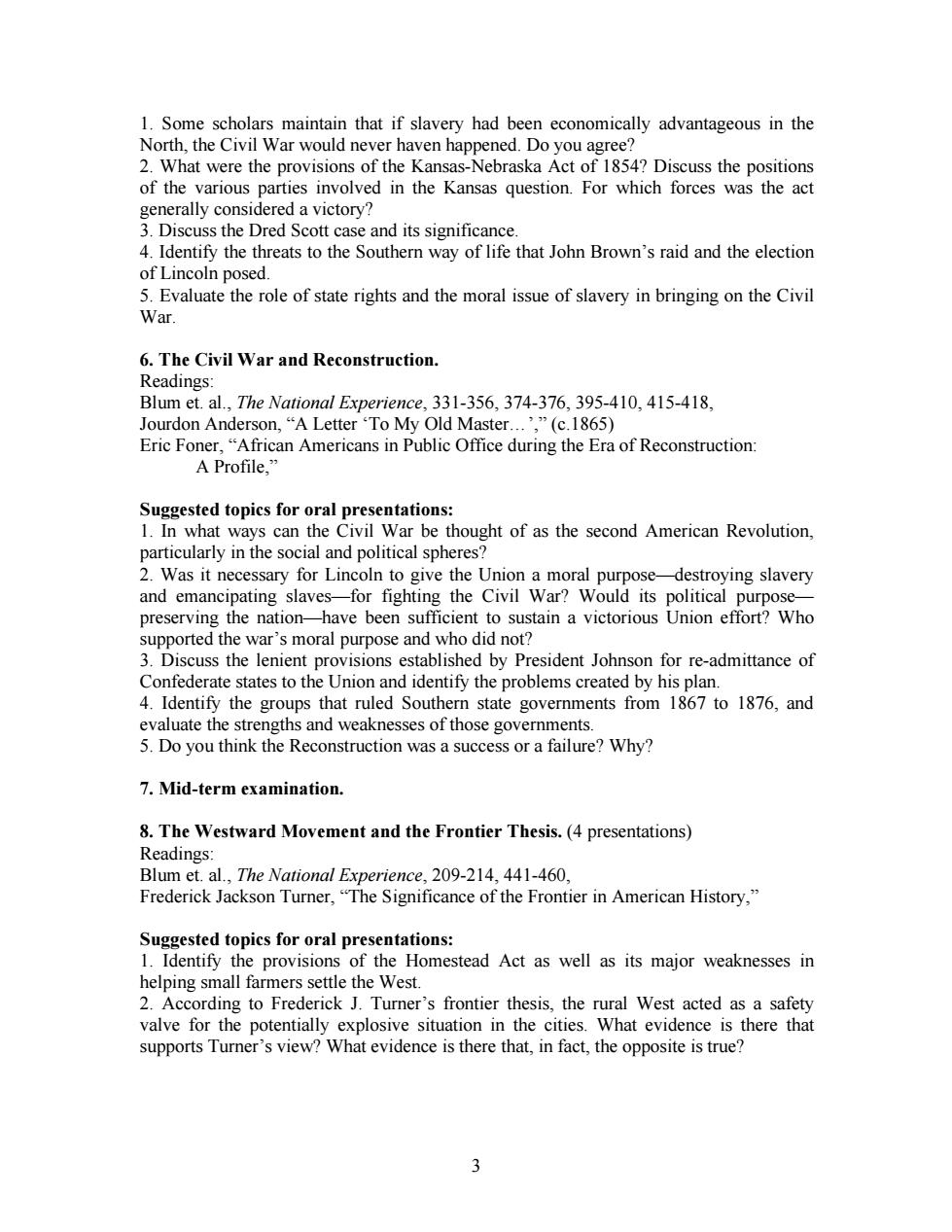
1.Some scholars maintain that if slavery had been economically advantageous in the North,the Civil War would never haven happened.Do you agree? 2.What were the provisions of the Kansas-Nebraska Act of 1854?Discuss the positions of the various parties involved in the Kansas question.For which forces was the act generally considered a victory? 3.Discuss the Dred Scott case and its significance. 4.Identify the threats to the Southern way of life that John Brown's raid and the election of Lincoln posed. 5.Evaluate the role of state rights and the moral issue of slavery in bringing on the Civil War. 6.The Civil War and Reconstruction. Readings: Blum et.al.,The National Experience,331-356,374-376,395-410,415-418 Jourdon Anderson,"A Letter To My Old Master...',"(c.1865) Eric Foner,"African Americans in Public Office during the Era of Reconstruction: A Profile,” Suggested topics for oral presentations: 1.In what ways can the Civil War be thought of as the second American Revolution, particularly in the social and political spheres? 2.Was it necessary for Lincoln to give the Union a moral purpose-destroying slavery and emancipating slaves-for fighting the Civil War?Would its political purpose- preserving the nation-have been sufficient to sustain a victorious Union effort?Who supported the war's moral purpose and who did not? 3.Discuss the lenient provisions established by President Johnson for re-admittance of Confederate states to the Union and identify the problems created by his plan. 4.Identify the groups that ruled Southern state governments from 1867 to 1876,and evaluate the strengths and weaknesses of those governments. 5.Do you think the Reconstruction was a success or a failure?Why? 7.Mid-term examination. 8.The Westward Movement and the Frontier Thesis.(4 presentations) Readings: Blum et.al.,The National Experience,209-214,441-460, Frederick Jackson Turner,"The Significance of the Frontier in American History," Suggested topics for oral presentations: 1.Identify the provisions of the Homestead Act as well as its major weaknesses in helping small farmers settle the West. 2.According to Frederick J.Turner's frontier thesis,the rural West acted as a safety valve for the potentially explosive situation in the cities.What evidence is there that supports Turner's view?What evidence is there that,in fact,the opposite is true? 3
3 1. Some scholars maintain that if slavery had been economically advantageous in the North, the Civil War would never haven happened. Do you agree? 2. What were the provisions of the Kansas-Nebraska Act of 1854? Discuss the positions of the various parties involved in the Kansas question. For which forces was the act generally considered a victory? 3. Discuss the Dred Scott case and its significance. 4. Identify the threats to the Southern way of life that John Brown’s raid and the election of Lincoln posed. 5. Evaluate the role of state rights and the moral issue of slavery in bringing on the Civil War. 6. The Civil War and Reconstruction. Readings: Blum et. al., The National Experience, 331-356, 374-376, 395-410, 415-418, Jourdon Anderson, “A Letter ‘To My Old Master…’,” (c.1865) Eric Foner, “African Americans in Public Office during the Era of Reconstruction: A Profile,” Suggested topics for oral presentations: 1. In what ways can the Civil War be thought of as the second American Revolution, particularly in the social and political spheres? 2. Was it necessary for Lincoln to give the Union a moral purpose—destroying slavery and emancipating slaves—for fighting the Civil War? Would its political purpose— preserving the nation—have been sufficient to sustain a victorious Union effort? Who supported the war’s moral purpose and who did not? 3. Discuss the lenient provisions established by President Johnson for re-admittance of Confederate states to the Union and identify the problems created by his plan. 4. Identify the groups that ruled Southern state governments from 1867 to 1876, and evaluate the strengths and weaknesses of those governments. 5. Do you think the Reconstruction was a success or a failure? Why? 7. Mid-term examination. 8. The Westward Movement and the Frontier Thesis. (4 presentations) Readings: Blum et. al., The National Experience, 209-214, 441-460, Frederick Jackson Turner, “The Significance of the Frontier in American History,” Suggested topics for oral presentations: 1. Identify the provisions of the Homestead Act as well as its major weaknesses in helping small farmers settle the West. 2. According to Frederick J. Turner’s frontier thesis, the rural West acted as a safety valve for the potentially explosive situation in the cities. What evidence is there that supports Turner’s view? What evidence is there that, in fact, the opposite is true?
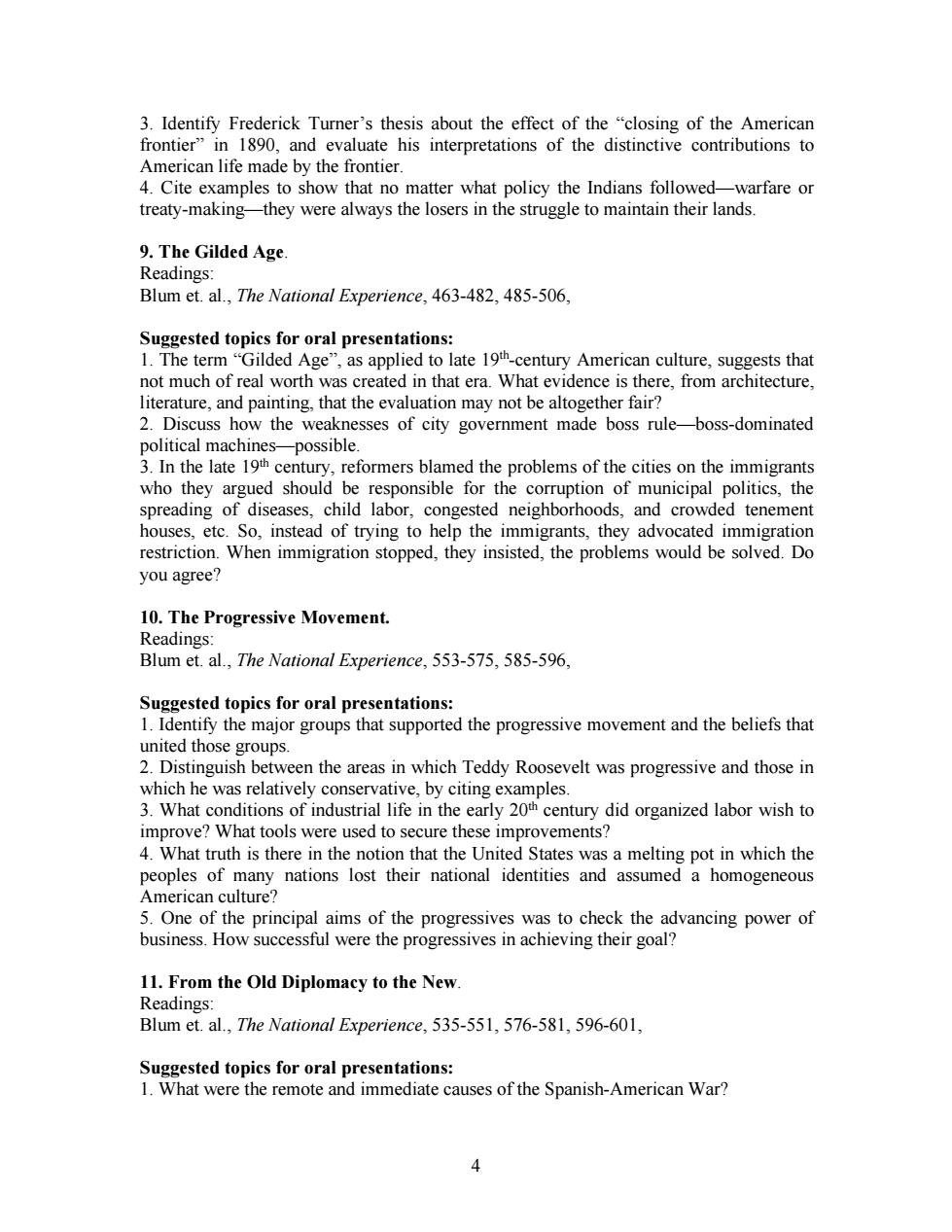
3.Identify Frederick Turner's thesis about the effect of the "closing of the American frontier"in 1890,and evaluate his interpretations of the distinctive contributions to American life made by the frontier. 4.Cite examples to show that no matter what policy the Indians followed-warfare or treaty-making-they were always the losers in the struggle to maintain their lands. 9.The Gilded Age Readings: Blum et.al.,The National Experience,463-482,485-506, Suggested topics for oral presentations: 1.The termGilded Age",as applied to late 19h-century American culture,suggests that not much of real worth was created in that era.What evidence is there,from architecture, literature,and painting,that the evaluation may not be altogether fair? 2.Discuss how the weaknesses of city government made boss rule-boss-dominated political machines-possible. 3.In the late 19th century,reformers blamed the problems of the cities on the immigrants who they argued should be responsible for the corruption of municipal politics,the spreading of diseases,child labor,congested neighborhoods,and crowded tenement houses,etc.So,instead of trying to help the immigrants,they advocated immigration restriction.When immigration stopped,they insisted,the problems would be solved.Do you agree? 10.The Progressive Movement. Readings: Blum et.al.,The National Experience,553-575,585-596, Suggested topics for oral presentations: 1.Identify the major groups that supported the progressive movement and the beliefs that united those groups. 2.Distinguish between the areas in which Teddy Roosevelt was progressive and those in which he was relatively conservative,by citing examples. 3.What conditions of industrial life in the early 20th century did organized labor wish to improve?What tools were used to secure these improvements? 4.What truth is there in the notion that the United States was a melting pot in which the peoples of many nations lost their national identities and assumed a homogeneous American culture? 5.One of the principal aims of the progressives was to check the advancing power of business.How successful were the progressives in achieving their goal? 11.From the Old Diplomacy to the New Readings: Blum et.al.,The National Experience,535-551,576-581,596-601, Suggested topics for oral presentations: 1.What were the remote and immediate causes of the Spanish-American War?
4 3. Identify Frederick Turner’s thesis about the effect of the “closing of the American frontier” in 1890, and evaluate his interpretations of the distinctive contributions to American life made by the frontier. 4. Cite examples to show that no matter what policy the Indians followed—warfare or treaty-making—they were always the losers in the struggle to maintain their lands. 9. The Gilded Age. Readings: Blum et. al., The National Experience, 463-482, 485-506, Suggested topics for oral presentations: 1. The term “Gilded Age”, as applied to late 19 th-century American culture, suggests that not much of real worth was created in that era. What evidence is there, from architecture, literature, and painting, that the evaluation may not be altogether fair? 2. Discuss how the weaknesses of city government made boss rule—boss-dominated political machines—possible. 3. In the late 19 th century, reformers blamed the problems of the cities on the immigrants who they argued should be responsible for the corruption of municipal politics, the spreading of diseases, child labor, congested neighborhoods, and crowded tenement houses, etc. So, instead of trying to help the immigrants, they advocated immigration restriction. When immigration stopped, they insisted, the problems would be solved. Do you agree? 10. The Progressive Movement. Readings: Blum et. al., The National Experience, 553-575, 585-596, Suggested topics for oral presentations: 1. Identify the major groups that supported the progressive movement and the beliefs that united those groups. 2. Distinguish between the areas in which Teddy Roosevelt was progressive and those in which he was relatively conservative, by citing examples. 3. What conditions of industrial life in the early 20 th century did organized labor wish to improve? What tools were used to secure these improvements? 4. What truth is there in the notion that the United States was a melting pot in which the peoples of many nations lost their national identities and assumed a homogeneous American culture? 5. One of the principal aims of the progressives was to check the advancing power of business. How successful were the progressives in achieving their goal? 11. From the Old Diplomacy to the New. Readings: Blum et. al., The National Experience, 535-551, 576-581, 596-601, Suggested topics for oral presentations: 1. What were the remote and immediate causes of the Spanish-American War?
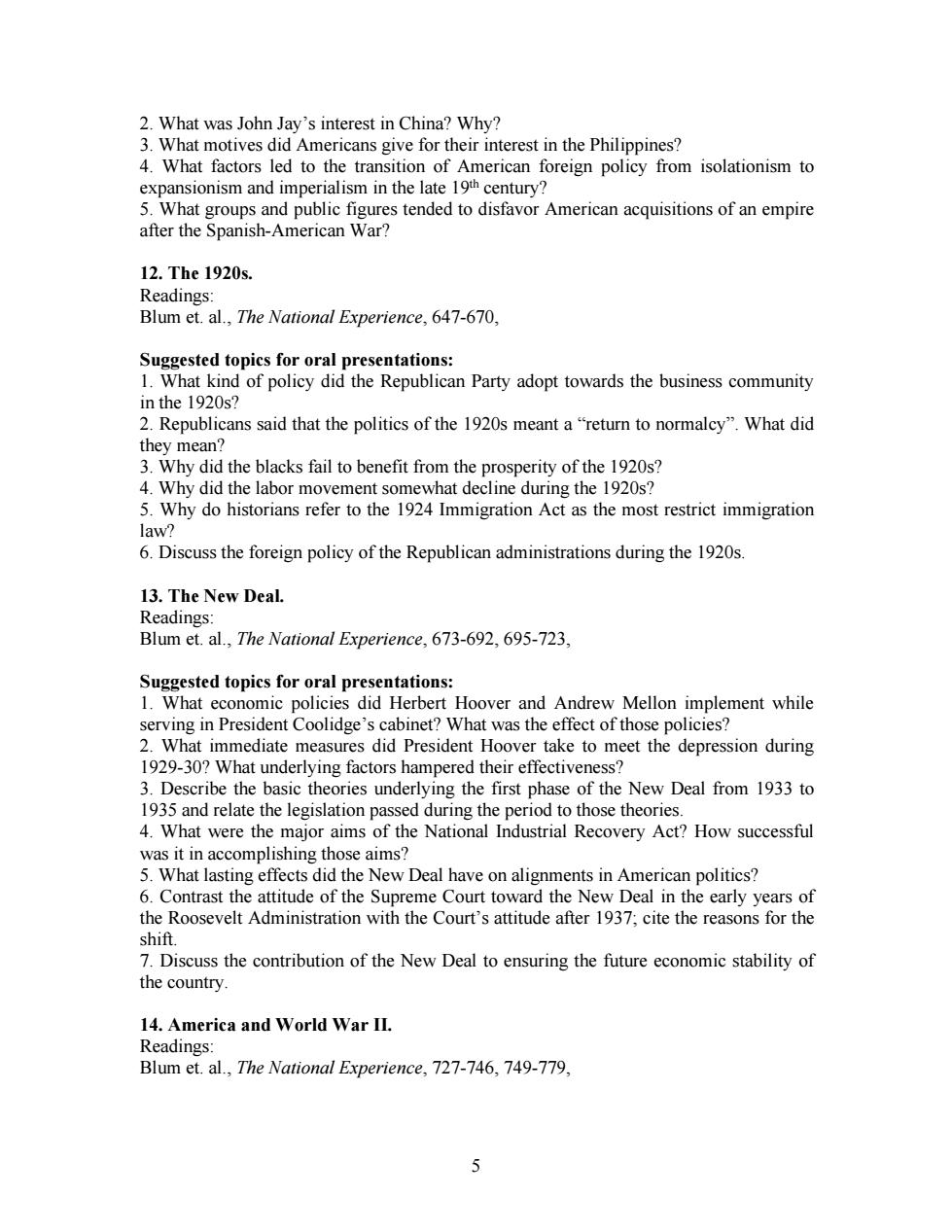
2.What was John Jay's interest in China?Why? 3.What motives did Americans give for their interest in the Philippines? 4.What factors led to the transition of American foreign policy from isolationism to expansionism and imperialism in the late 19th century? 5.What groups and public figures tended to disfavor American acquisitions of an empire after the Spanish-American War? 12.The1920s. Readings: Blum et.al.,The National Experience,647-670, Suggested topics for oral presentations: 1.What kind of policy did the Republican Party adopt towards the business community in the 1920s? 2.Republicans said that the politics of the 1920s meant a"return to normalcy".What did they mean? 3.Why did the blacks fail to benefit from the prosperity of the 1920s? 4.Why did the labor movement somewhat decline during the 1920s? 5.Why do historians refer to the 1924 Immigration Act as the most restrict immigration law? 6.Discuss the foreign policy of the Republican administrations during the 1920s. 13.The New Deal. Readings: Blum et.al.,The National Experience,673-692,695-723, Suggested topics for oral presentations: 1.What economic policies did Herbert Hoover and Andrew Mellon implement while serving in President Coolidge's cabinet?What was the effect of those policies? 2.What immediate measures did President Hoover take to meet the depression during 1929-30?What underlying factors hampered their effectiveness? 3.Describe the basic theories underlying the first phase of the New Deal from 1933 to 1935 and relate the legislation passed during the period to those theories. 4.What were the major aims of the National Industrial Recovery Act?How successful was it in accomplishing those aims? 5.What lasting effects did the New Deal have on alignments in American politics? 6.Contrast the attitude of the Supreme Court toward the New Deal in the early years of the Roosevelt Administration with the Court's attitude after 1937;cite the reasons for the shift. 7.Discuss the contribution of the New Deal to ensuring the future economic stability of the country. 14.America and World War II. Readings: Blum et.al.,The National Experience,727-746,749-779. 5
5 2. What was John Jay’s interest in China? Why? 3. What motives did Americans give for their interest in the Philippines? 4. What factors led to the transition of American foreign policy from isolationism to expansionism and imperialism in the late 19 th century? 5. What groups and public figures tended to disfavor American acquisitions of an empire after the Spanish-American War? 12. The 1920s. Readings: Blum et. al., The National Experience, 647-670, Suggested topics for oral presentations: 1. What kind of policy did the Republican Party adopt towards the business community in the 1920s? 2. Republicans said that the politics of the 1920s meant a “return to normalcy”. What did they mean? 3. Why did the blacks fail to benefit from the prosperity of the 1920s? 4. Why did the labor movement somewhat decline during the 1920s? 5. Why do historians refer to the 1924 Immigration Act as the most restrict immigration law? 6. Discuss the foreign policy of the Republican administrations during the 1920s. 13. The New Deal. Readings: Blum et. al., The National Experience, 673-692, 695-723, Suggested topics for oral presentations: 1. What economic policies did Herbert Hoover and Andrew Mellon implement while serving in President Coolidge’s cabinet? What was the effect of those policies? 2. What immediate measures did President Hoover take to meet the depression during 1929-30? What underlying factors hampered their effectiveness? 3. Describe the basic theories underlying the first phase of the New Deal from 1933 to 1935 and relate the legislation passed during the period to those theories. 4. What were the major aims of the National Industrial Recovery Act? How successful was it in accomplishing those aims? 5. What lasting effects did the New Deal have on alignments in American politics? 6. Contrast the attitude of the Supreme Court toward the New Deal in the early years of the Roosevelt Administration with the Court’s attitude after 1937; cite the reasons for the shift. 7. Discuss the contribution of the New Deal to ensuring the future economic stability of the country. 14. America and World War II. Readings: Blum et. al., The National Experience, 727-746, 749-779

Suggested topics for oral presentations: 1.Describe FDR's formulation and execution of American foreign policy and buildup of the country's military capabilities. 2.What were the content and the significance of the Nye Committee investigations? 3.Discuss the worsening of relations between the U.S.and Japan in the late 1930s.Why? 4.Why did the Lend-Lease Act commit the United States to more than just economic aid to the Allies? 5.How did WWII affect the social and economic position of blacks and women in the U.S.? 6.What contribution did the Soviet Union make to the war effort against Germany and Japan? 15.The 1960s:Social Upheaval and the Rise of a Counterculture Readings: Blum et.al.,The National Experience,824-826,844-845,851-860, Suggested topics for oral presentations: 1.What factors in American society led to the upheaval of the 1960s? 2.To what extent did political leaders-especially the presidents-contribute to the civil rights reform? 3.Martin Luther King's idea of non-violent protest. 4.What were the fruits of the Civil Rights Movement? Final Exam. 6
6 Suggested topics for oral presentations: 1. Describe FDR’s formulation and execution of American foreign policy and buildup of the country’s military capabilities. 2. What were the content and the significance of the Nye Committee investigations? 3. Discuss the worsening of relations between the U.S. and Japan in the late 1930s. Why? 4. Why did the Lend-Lease Act commit the United States to more than just economic aid to the Allies? 5. How did WWII affect the social and economic position of blacks and women in the U.S.? 6. What contribution did the Soviet Union make to the war effort against Germany and Japan? 15. The 1960s: Social Upheaval and the Rise of a Counterculture Readings: Blum et. al., The National Experience, 824-826,844-845, 851-860, Suggested topics for oral presentations: 1. What factors in American society led to the upheaval of the 1960s? 2. To what extent did political leaders—especially the presidents—contribute to the civil rights reform? 3. Martin Luther King’s idea of non-violent protest. 4. What were the fruits of the Civil Rights Movement? Final Exam